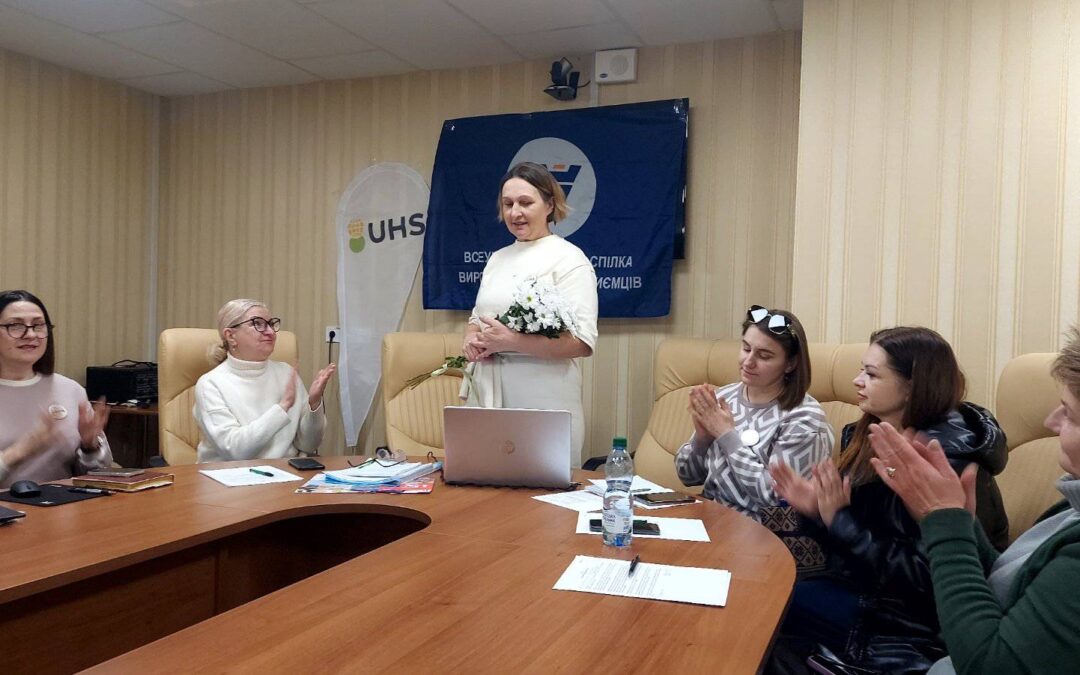
Apr 17, 2024
In a first for Ukraine, in-home childcare workers including nannies and babysitters organized and then elected domestic worker Tetiana Lauhina to head their new labor organization, Union of Home Staff (UHS).
“[My colleagues] are amazingly hard-working and well-educated. I want all of them to be recognized as workers and officially protected,” says Lauhina in a video interview.
The Union of Home Staff (UHS), formed by 17 domestic worker activists, will vigorously advocate with Ukraine’s lawmakers and government to ensure protections for domestic workers and formalization as workers under the country’s labor law.
As an outgrowth of nongovernmental organization Union of Home Staff (UHS), the new union will continue to use its allied organization’s name and acronym, UHS, expanding its services as an information hub and community center, including for its 1,800 Facebook members.
Ukraine’s first nationwide survey of domestic workers last year found that working without contracts and formal recognition had left most survey respondents victims of low pay, wage theft, confusion about employment status, exclusion from the country’s pension system and minimal capacity to exercise their right to freedom of association. And, without legal formalization as workers, Ukraine’s domestic workers lack access to care rights and services for themselves and their families—including maternity and child benefits, long-term care services and disability compensation for workers who die or are injured in their employers’ homes.
“[The domestic worker] is not secure and she is nobody for the state,” says Lauhina.
Because women account for three-quarters of the 75.6 million domestic workers globally, domestic worker rights are key to the achievement of gender equality. On International Women’s Day this year, the ILO issued a new policy brief urging governments and employers’ organizations to ensure that domestic workers have access to labor rights and social protections.
Nongovernmental organization UHS was formed in 2019 with support from Ukraine labor rights nongovernmental organization Labor Initiatives (LI) and the Solidarity Center to raise awareness about labor rights challenges for Ukraine’s care economy workers and support the country’s legislative efforts to formalize domestic work.

Apr 11, 2024
Just days before the Hotel Farah Casablanca closed for a yearlong renovation at the end of February, its union negotiated to ensure that workers would not be left without an income and could return to their positions when the hotel reopened.
The deal, known as a protocol agreement, struck by the National Federation of Hotel, Restaurants and Tourism (FNHRT), an affiliate of the Moroccan Workers Union (Union Marocaine du Travail, UMT), and the Barceló Group, the hotel’s new owner, guarantees that all 102 permanent workers will receive 79.5 percent of their salaries under $500 and 75 percent of salaries above $500 for a year plus 70 percent of the 13th month salary bonus.
The new agreement builds on an earlier deal, negotiated and signed with the previous owner prior to the sale to Barceló, which boosted pay between 7 percent and 12 percent and ensured smooth labor relations.
“If they hadn’t come to an agreement, they couldn’t have sold the property. They had to stabilize the situation with the workers,” said Hadira Afer, worker delegate.
She added that reaching the new agreement “was a struggle.” And while it did not include everything the workers wanted, it was still good for the staff and the union.
Al-Aji Muhammad, the head of the union office at the hotel, said “these marathons of negotiations were very challenging, prompting the union to fiercely defend workers’ rights. The first offer submitted by the employer to pay 50 percent of salaries was very disappointing to the union.‘’
Morocco is experiencing a tourism boom, especially in the leadup to the 2030 World Cup, which it will jointly host with Portugal and Spain. Hotels and other facilities across the country are under construction and renovation.
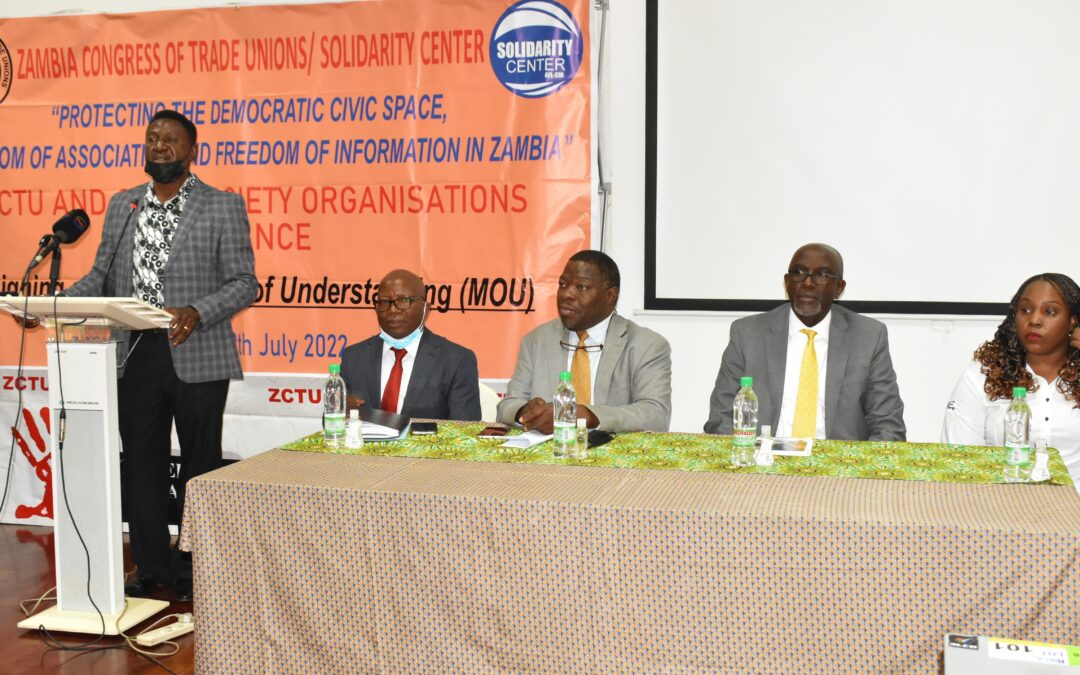
Apr 10, 2024
A solidarity action by more than 1,000 workers on the streets of Lusaka, Zambia, last month highlighted an Africa-wide, worker-led campaign to address the consequences of mounting government debt and illicit financial flows.
“It is necessary for Africa’s debt to be canceled to stop the bleeding of African economies,” said Rose Omamo, deputy president of the International Trade Union Confederation-Africa and IndustriALL vice president, who helped deliver a petition to Zambia Labor and Social Security Minister Brenda Tambatamba March 21, 2024. Solidarity Center partner ITUC-Africa represents 17 million working men and women in 52 African countries.
Citing ”grave concerns” about borrowing governments’ lack of transparency in securing, using and managing loans, ITUC-Africa is calling for official and private creditors to restructure Africa’s debt to protect citizens’ access to vital social protection services such as education, health, pensions, infrastructure, sanitation and water.
Social protection is a key driver in the achievement of Economic Community of West African States (ECOWAS) Vision 2050, which includes among its five pillars sustainable development and social inclusion. Indeed, the Organization of Trade Unions of West Africa (OTUWA) is spearheading a subregional “Healthcare Is A Human Right” campaign.
To further protect the continent’s citizens against resource grab, illicit financial flows—which include multinational tax dodging, government corruption and other criminal activity—must be curbed, say unions. Doing so could cut by almost half the $200 billion annual financing gap for achieving the UN Sustainable Development Goals, reports the UN Conference on Trade and Development (UNCTAD).
An estimated $88.6 billion, equivalent to 3.7 percent of Africa’s GDP, is leaving the continent as illicit capital flight annually, according to UNCTAD’s Economic Development in Africa Report 2020.
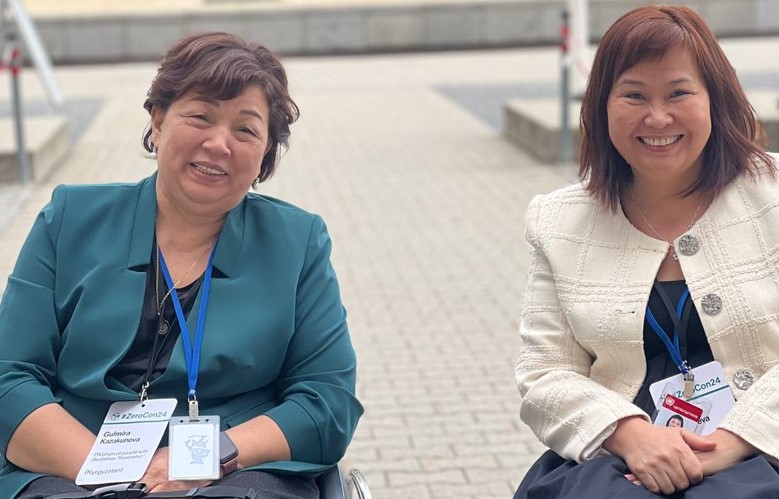
Mar 18, 2024
More than 1 billion people, or 16 percent of the world’s population, experience a significant disability, and 80 percent to 90 percent of working age people with disabilities are unemployed in developing countries. People with disabilities are more likely to experience adverse socioeconomic outcomes than those without disabilities, such as under education, a higher drop-out rate, lower levels of professional integration and higher poverty levels.
In Central Asia, the Solidarity Center partners with disability rights groups to promote inclusive employment, including through inclusive education. Zakhira Begalieva and Gulmira Kazakunova, disability rights activists who head Kazakhstan’s I Teach Me and Kyrgyzstan’s Ravenstvo, respectively, last month joined more than 1,000 people from 100 countries in Vienna for the UN’s 2024 Project Zero Conference to learn more about Inclusive education and information and communication technology (ICT), and to explore regional and global alliance-building opportunities.
“Here you feel some kind of freedom and you feel that opportunities are not limited,” said Kazakunova.
In Kazakhstan, I Teach Me provides online training for youth with disabilities to prepare them for future employment and, in Kyrgyzstan, Ravenstvo educates women with disabilities to help them secure jobs and advocates for inclusive education to help increase job market participation for women with disabilities.
The UN Convention on the Rights of Persons with Disabilities (CRPD), which aims to create conditions for persons with disabilities to participate in society on an equal basis with others and free from discrimination, was ratified by Kazakhstan in 2015 and Kyrgyzstan in 2019. However, discrimination against people with disabilities has persisted.
In Kazakhstan, the UN Development Program (UNDP) reports that the country’s more than 750,000 people with disabilities every day, “face obstacles on the way to gaining equal access to education, health and employment.” The Solidarity Center in Kazakhstan is supporting partners who, after years of advocating for inclusivity, are now focused on implementation of new legislative measures and a legal framework adopted to ensure implementation of CRPD. Starting this year, more than 34,000 workers with disabilities were covered by measures to promote employment.
In Kyrgyzstan, the Solidarity Center is supporting a program focused on reducing discrimination in employment and promoting the labor rights of workers with disabilities—the first of its kind in the country. A 2022 Solidarity Center study revealed that only 20 percent of people with disabilities surveyed in Kyrgyzstan were employed, most in insecure seasonal or part-time jobs. Through a combination of legislative analysis, large-scale media campaigns, the development of a mobile application, individual legal support, educational trainings and collaboration with key organizations, the Solidarity Center is working to make real change for people with disabilities in Kyrgyzstan, including efforts to harmonize regulations and mechanisms in the country’s labor code to improve laws impacting people with disabilities.
Unions and other worker associations can be especially effective advocates for disability rights. The International Labor Organization (ILO) reports that unions are the strongest voices advocating for the rights of people with disabilities at work around the world. Public-sector unions, where survey data shows workers with disabilities experience higher levels of union representation, are natural organizers around rights issues because of their position at the nexus of governance and work.
Learn more about strategies that civil society allies in Kyrgyzstan, with Solidarity Center support, are using to advance and protect the rights of people with disabilities—including coalition-building and joint advocacy projects with national and local disability rights organizations, pro-bono legal support, data collection, legislative reform and trainings-of-trainers with disabilities. [Video in Russian]
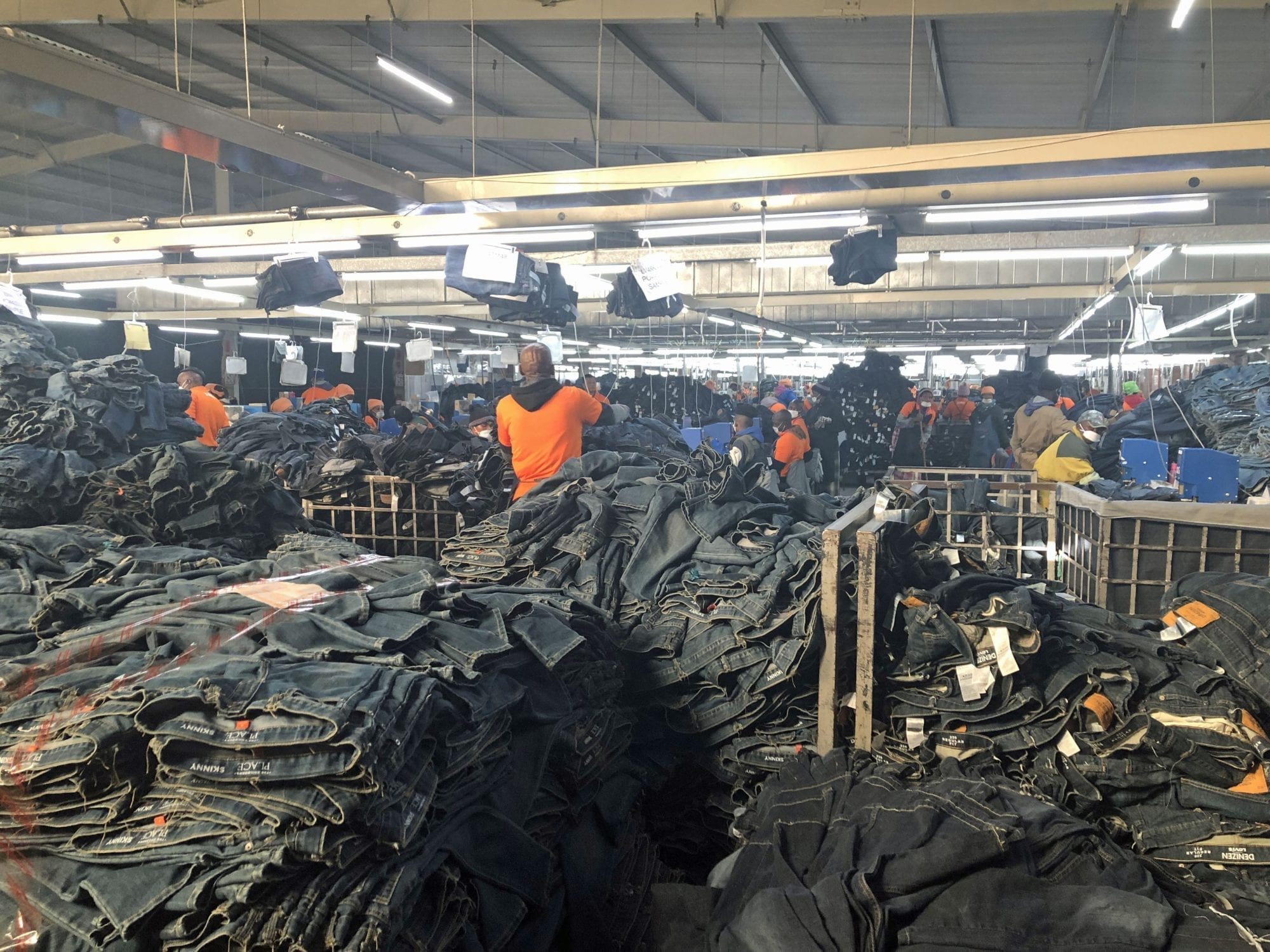
Mar 7, 2024
When workers can “speak up, articulate and manifest collective agency that ultimately improves the terms and conditions of their employment and their livelihoods,” they also have a role in shaping their societies and “contributing to democratic participation beyond the workplace,” says a new report released today by the U.S. Department of Labor’s Bureau of International Labor Affairs (ILAB).
“Worker Voice: What it is, What it is Not, and Why it Matters,” was produced by Penn State University’s Center for Global Workers’ Rights (CGWR).
“The term ‘worker voice’ is used for lots of scenarios where workers have some sort of participation but not necessarily a say in issues that affect their lives and livelihoods,” said Solidarity Center Executive Director Shawna Bader-Blau. “If you care about democracy and worker rights, this is the seminal report.”
For example, corporate social responsibility programs that interview workers on site, under the helpful gaze of management, may provide a public relations boost to the company but do not capture worker voice; indeed, they often contribute to wage suppression and gloss over lax safety standards. Likewise, workplace suggestion boxes, which require zero response from management, neither provide workers with a voice nor help them ensure dignity and equity on the job.
“The most effective forms of worker voice are institutions and mechanisms that enhance workers’ ability to elect, represent, protect, include, enable and empower workers and their organizations,” according to the report, which highlighted democratic trade unions and collective bargaining as key.
Legitimate and effective channels for worker voice exist and include enforceable brand agreements (EBAs), such as the Accord on Fire and Building Safety in Bangladesh, which identified and remediated 97,235 high-risk fire, structural and electrical safety violations following the deadly collapse of Rana Plaza. In Lesotho, where brand-led, voluntary codes of conduct failed to address rampant gender-based violence and harassment, binding and enforceable agreements among unions, civil society, international clothing brands and worker rights organizations (including the Solidarity Center) and Nien Hsing, a garment manufacturer, are changing attitudes, protecting workers and helping to end violence and harassment on the job.
In addition, the report cites the Rapid Response Labor Mechanism, under the United States-Mexico-Canada Agreement (USMCA), which has provided expedited enforcement of freedom of association and collective bargaining rights at factories in Mexico for more than 30,000 workers. Other channels include organizing along migration corridors and among domestic and farm workers; and freedom of association protocols.
The report describes six components that are crucial for effective worker voice: election of representatives; representation of members; diversity in leadership, on committees and throughout organizations; protection of workers from anti-union discrimination, harassment, threats and violence; the enabling of worker organizations to carry out functions by ensuring members have time, space, information and training; empowerment of workers and their organizations to engage in protected trade union activities, including collective bargaining and strikes, by leveraging state and private mechanisms that have sanction power on employers.
The report’s case studies include many countries and sectors where the Solidarity Center has long-term partnerships with unions that provide effective worker voice, among them, Bangladesh, Honduras, Lesotho, Mexico and Myanmar.
Recognizing the importance of democratic freedoms in securing effective worker voice, the Solidarity Center has long partnered with unions fighting for their right to democratic freedoms, including freedom of association and of assembly. These efforts include the historic 2023 Zambia Summit for Democracy, where participating unions and governments shared strategies on how unions can advance democracy through one of its most essential components—worker rights—and Solidarity Center support for union partners fighting for their rights in Bahrain, the Philippines, Swaziland and Tunisia.
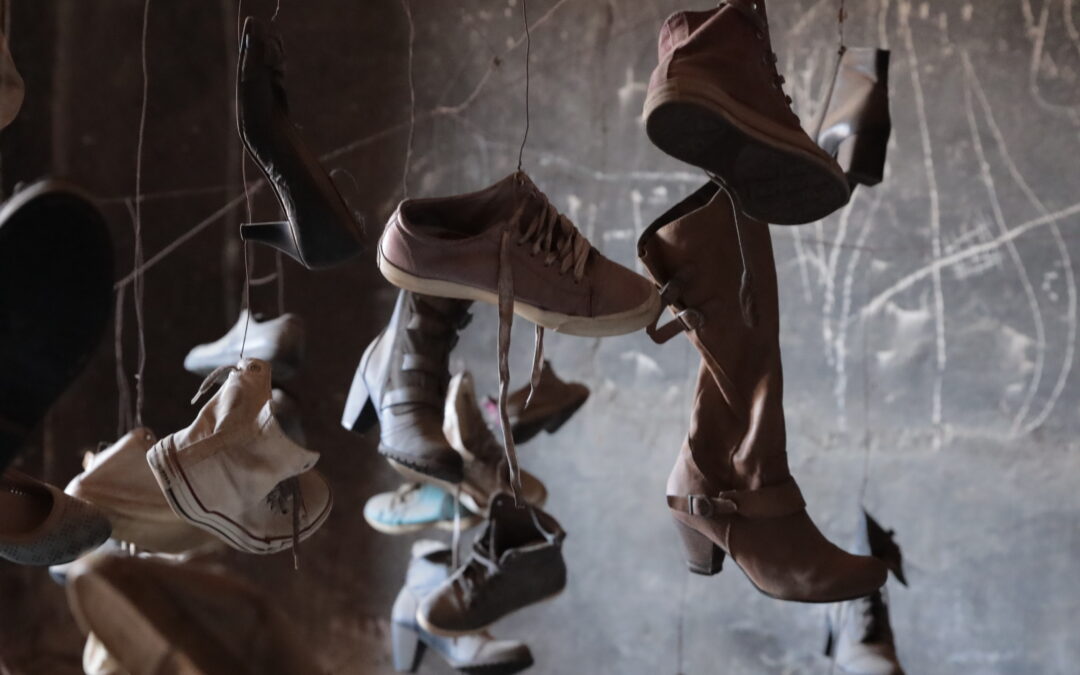
Mar 5, 2024
Kosovo teachers’ union SBASHK (United Union of Education, Science and Culture of Kosovo) is forging a shared school-family-community-policymakers’ agenda to build a multi-tiered mental health support system. This successful effort includes hosting a national conference last month during which attendees agreed to collaborate on solutions going forward and the Ministry of Education committed to increasing the number of school psychologists, addressing national mental health legislation and supporting national mental health awareness campaigns.
The conference—which brought together more than 80 representatives of Kosovo education unions and other union and civil society organizations, education, healthcare, government, the Kosovo Parliament, media, academia, students and parents’ councils—sought to destigmatize discussion of mental health; examined the latest research and best practices on mental health promotion, prevention and intervention for students, teachers and families; and facilitated opportunities for parents, policymakers, school administrators and teachers to work together on solutions.
“Mental health in Kosovar society is intertwined with a series of factors such as transgenerational trauma from the [1990s Kosovo] war, low salaries that make it difficult to meet vital needs, high unemployment rates, unsafe environments—including cases of sexual assaults—and poor-quality education,” Member of Parliament and University of Pristina Psychology Professor Fitim Uka told conference attendees.
During panel discussions, workshops and breakout sessions, roadblocks to mental health improvement in schools were identified, resulting in a joint appeal for more psychologists in schools, teacher and psychologist training programs, better teacher working conditions, specialized service referrals and advocacy campaigns for reducing mental health stigma, and, above all, for stakeholders to work together.
“This conference proves that, together, we can help for the good of a school and for an even better education,” said SBASHK Chairperson Rrahman Jasharaj.
Solidarity Center Executive Director Shawna Bader-Blau, who also presented, reinforced the call for a shared school, family, community and policymakers’ agenda.
“We’re all in this together, to help our children succeed and help our schools succeed,” she said.
During the 1998-1999 Kosovo war, SBASHK played a vital role in preserving education services. Today SBASHK advocates for better working conditions and fair salaries, safer schools and professional growth opportunities for teachers. A five-week 2022 teachers’ strike for a living wage in response to COVID pandemic and Ukraine war-related inflation earned teachers a significant salary increase, but regional economic challenges continue to threaten teachers’ well-being.
The February 21 and 22 Pristina conference, supported by the Solidarity Center, united stakeholders dedicated to enhancing mental health support in schools including SBASHK, the Ministry of Education, Science, Technology and Innovation (MESTI), the Ministry of Health (MoH), the Parliamentary Committee on Education, the Union of Independent Trade Unions of Kosovo (BSPK), the European Trade Union Committee for Education (ETUCE), Slovenia Education Union (SVIZ), the Education Unions of Albania (SPASH and FSASH), Union of Education, Science and Culture North Macedonia (SONK), the Association of Municipalities, the Municipal Directorate of Education (MDE), the Council of Parents (KP), the Council of Youth (KYC), the Chamber of Doctors, the Chamber of Nurses, the Department of the Psychology/University of Pristina (DP), Kosovo Education Center (KEC), the Kosovo EdGuard Institute and the Kosovo Association of Independent Journalists (AGK).






